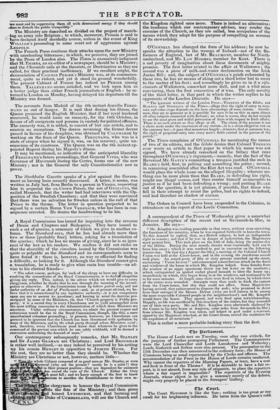O'CONNELL has changed the form of his address; he now
be speaks the attention to the wrongs of Ireland—not of the Re- formers of England, but of Mr. BEAUMONT, member for North- umberland, and Mr. LAW HODGES, member for Kent. There is a sad poverty of imagination about these documents of mighty promise. The first letter related to the. affair at Wallstown ; the second was a piece of milk-and-water declamation on the Irish Juries Bill ; and, the subject of O'CONNELL'S griefs exhausted by these two, he has no means of eking out a third letter but to recur to the matter of his first; and accordingly he gives us in it a rifa- cimento of "Wallstown, somewhat more dull, and not a whit more convincing, than the first concoction of it was. The only novelty of the third letter, is that part in which the writer replies to his opponents of the London Diurnals. He says- " The ignorant writers of the London Press—TortnESts of the Globe, and BARNES and STERLING of the Times—allege that the right of entry to mea- sure and value crops depends on the loose phraseology of some statute. Gentle- men, they are as ignorant as it is possible for men to be on this as upon almost all other subjects connected with Ireland; or, what is worse, they do not scruple to use the most gloss and wilful perversion of facts with respect to Irish affairs. There is no such statute as they allege at all. The claim of the parsons is not a claim made under the enactment of any statute—it is a claim alleged to rest on the common law—it goes that monstrous length—it insists, that at common law, the right of perpetual entry into every man's fields existed in the parson of the parish ! "
The Times complains of O'CONNELL for mentioning the names of two of its editors, and the Globe denies that Colonel TORRENS ever wrote an article in that paper to which his name was not signed. We have already remarked on the fallacy that runs throughout OtoNNELL's argument,—namely, that the fact of the Reverend Mr. GAVIN'S committing a trespass justified the mob in BLAKE'S field, first, in pelting and assaulting the police ; second, in remaining assembled after the Riot Act was read. O'CONNELL would place the whole issue on the alleged illegality ; whereas no- thing can be more plain than that BLAKE, in defending his right, might use illegal means, and thus render himself as amenable to justice as if he had been defending a wrong; and putting BLAKE out of the question, it is yet plainer, if possible, that those who fell in their attempt to resist the police, had no rights to defend, and had therefore no shadow of excuse.


























 Previous page
Previous page